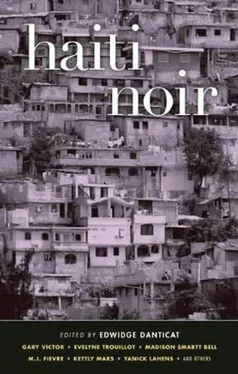In the bedroom at the other end of the hall, Beatrice wouldn’t get up before dawn. I went back to bed and waited for daylight.
When she returned from the funeral, Beatrice took out Marie Carlotta’s birth certificate. “Now this child has no father and no mother, but luckily she has aunts who love her very much and will take care of her. While I’m waiting for her to go to the great-aunt’s, I’ll take good care of her. Tomorrow I have an appointment with the lawyer.”
I leaned over the two little girls lying on their backs in their playpen and picked one of them up. I kissed my daughter and gave her to Beatrice.
Ever since then I’ve been living in agony, an agony I deliberately chose. I had to learn to accept the brutal and unexpected pain of separation. Every gesture has become an open wound that gets larger, adds onto the other wounds, accumulating like a blazing fire that can’t be put out. When I put her in Beatrice’s arms, she was so very attentive to the little “orphan.” I hugged the other baby and felt tears well up in my eyes, stinging my flesh. Hearing my daughter cry, knowing that the sound of my voice and the closeness of my body could calm her down, yet not budging, was agonizing. Letting Beatrice take care of her until her final departure, even more so.
I would have liked the process to go faster, the great-aunt to come over, sign the necessary papers, and leave with my daughter. That way I wouldn’t have her before my eyes every minute of the day, treating her like someone else’s child, watching her separating a bit more from me and turning to Beatrice, with the survival instinct natural to human beings.
There was no turning back now, and despite it all I did rejoice that my trick had succeeded. My daughter would have a much better life. She would have all the opportunities I didn’t dare dream of anymore. One day, I saw Beatrice looking at me while I was watching the child asleep in her cradle, with the other one’s daughter snuggled up against me. Did this childless widow understand my deception? Did she suspect that for once I had taken my destiny into my own hands, amending her aunt’s decision?
It’s too bad that, since then, every time my arms close around the one I kept, I can feel pieces of my heart disintegrating, then coming together again as I wait for the day that my daughter will leave me.
TWENTY DOLLARS
by Madison Smartt Bell
Morne du Cap
In the twilight of his last sliver of dream, Magloire saw VENDOLA, not as a single slip of green but all the bills fanned out in a diadem and glowing with an incandescent light, like a crown set on the head of Christ Resurrected. Indeed, the dollar bills crowned his own head but at the same time they appeared far away, so that he could not reach or grasp them. In this slippery zone between sleep and waking he often received counsel of his spirits, and now he believed that èzili Je Wouj was promising him he might conquer such a sum in the course of the day: twenty U.S. dollars-too small an amount to resolve his difficulties, thus not so large as to be unattainable.
He woke completely now, to cockcrow and the wispy sound of a palm leaf broom, sweeping the yard beyond the door. It was still almost completely dark. Anise’s sleeping breath flowed onto his forearm. She had turned toward him on the thin pallet where both of them slept. Were she awake she would not have done it. The whisper of air stirred something in him which he hurried to suppress, sitting up on the pallet and wiping his face with the back of his wrist. When he was a little younger, still in his teens, Magloire had been counseled by Doctor Oliver to wear a kapòt during all acts of love; such was the sort of foolishness that a well-meaning blan would conceive. He, Magloire, enjoyed only natural actions and undertook no actions that were not natural; therefore, he could seldom bring himself to wear a condom and by extension had not lain with his wife, as a man with a woman, for longer than two months. Besides, Anise would be irritable if he woke her now.
In a market basket near the door, draped with colored netting like a Christmas parcel, their son Léonty breathed easily in sleep. He was nearly two years old and had to curl his legs under him to fit into the basket, but he needed the protection of the net because mosquito bites had caused his fever; mosquitoes were still whining in the close humid air of the room, though the light was growing quickly. Magloire turned back the net for a moment to look at his son’s face. It seemed to him that the fever had passed, though he had not been able to find money to buy medicine.
In the yard outside the back door there was clean water in the white enamel bowl. Magloire used a little of it to wash and brush his teeth. The whispering of the broom had stopped and he straightened up to see his mother standing over a cluster of scrawny hens, holding a scant handful of cracked corn in one hand, irresolutely.
Presently she scattered half for the hens and returned the rest to the slack cloth bag. Her deep-set eyes passed over him without stopping. Magloire knew that later in the day she would pound the remainder of the corn and mix it with a greater quantity of dirt to make small cakes-not very nourishing but able for a little while to block the most cutting pangs of hunger. Some passersby might purchase them. If he could, he would buy green coffee beans at market and a little charcoal so that his mother might roast the beans in her iron caldron and pound them in her mortar if the customer desired. There was some profit to be made preparing coffee.
The bare-swept area of their yard climbed sharply up the jagged backside of Morne du Cap. On the high ground, propped on stones beneath a stand of bamboo, were two gas generators Magloire had taken for repair. He was trained as mechanic, electrician, plumber, refrigerator repairman, and could also drive trucks, guide tourists, and pilot small boats (in one case all the way to Miami). But lately no one could be found to purchase any of these skills. The two generators ran smoothly now but their owners would not pay to recover them, so Magloire was simply holding them hostage. This situation reminded him of a story he had heard from the capital: some zenglendo had summoned a man to shine their shoes, then kidnapped him when he was done, though the most they could raise for a ransom was twenty dollars.
VEN DOLA. Shaking off the thought of the kidnapping, he walked through the house, pulled on a shirt, and came out onto the street. Through the alley that cut down to the waterfront, the rising sun blazed off the surface of the harbor. From the neighboring bar curled a stale odor of last night’s frying. Magloire’s stomach fisted. Squinting a little in the brilliance of the light, he walked through the alley to the edge of the breakwater and stood breathing in the clean salt air. Men called to each other from a couple of small boats going out to fish. Rope creaked against a makeshift mast as a sail bellied full, and from behind him Magloire could hear the steady hollow thump of his mother’s mortar. It was said that one should take ten deep breaths each day before the sea.
Doctor Oliver drifted to a halt in the public square before the cathedral, a madman standing bare-headed under the scorching noonday sun. Once there had been shade trees in this place, but those were plowed under in some renovation and now there was nothing but bare flagstones and the statues of the national heroes, the metal ones looking as if they might melt. There were no people about on the square though a few had pressed themselves into tiny pools of shadow under the lintels of the church across the way.
In the southwest corner of the square was a new monument Doctor Oliver had not seen before, a different style from the venerable statues: three curving husks of polished aluminum, grouped together and standing about man-high. When he approached he saw there were inscriptions on the inner curves; the sculpture was arranged so that he had to step inside the grouping to try to read them. The effect was obscurely menacing, like standing inside some sort of iron maiden that had not yet been completely shut. Doctor Oliver did not feel well. He needed to take off his teardrop sunglasses to read and the burst of reflected light worsened his headache, which might have been brought on by sun or by early stages of narcotic withdrawal. The inscriptions were in Creole, which he had trouble puzzling out; he was more functional in French.
Читать дальше












